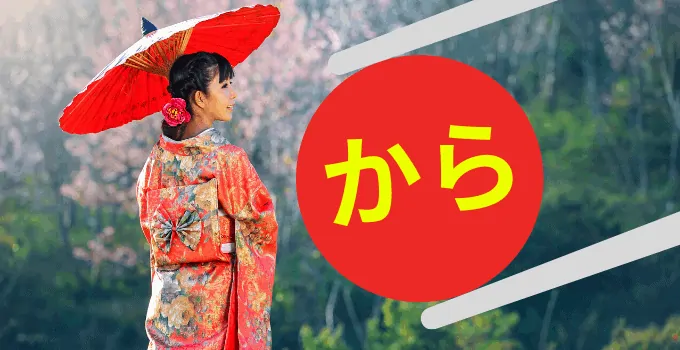A way to level up in any language is to move beyond simple sentences with conjunctions like “and” or “or.”
Conjunctions, words that connect two clauses together, allow you to express complex thoughts and emotions and can make you sound much more fluent, as well.
In this article, we’ll look at how to use the conjunction から (kara), the Japanese word for “because.”
How do you say “because” in Japanese?
The Japanese word for “because” is から (kara). Unlike English, where the word “because” appears at the beginning of the clause it modifies, in Japanese the word から is placed after the clause it applies to. Placement aside, the word is fairly versatile, and can follow either a verb or a form of the copula (です, desu or だ, da).
Some resources will list だから (dakara) as the word for because, but this is actually just the casual form of the copular (だ, da) followed by から.
The basics of から (kara)
You say “because” in Japanese by using the word から (kara).
Unlike many Japanese words, which can be written in kanji, から only ever appears in hiragana.
Just like the English “because,” から is a conjunction, a type of word used to connect two clauses in a sentence.
More technically speaking, it’s a coordinating conjunction, used to show the relationship between the main clause of a sentence with a subordinate clause that can’t stand alone.
Where to place から in a clause
Unlike in English, where “because” appears at the beginning of a clause it modifies, the Japanese から needs to be placed at the end of the clause it applies to.
This means that in most cases you will see から between the subordinate clause and the main clause.
We’ll look at some exceptions to this later in the article, however.
Examples
「うちに帰りたいから、仕事をもっと早くしなさい。」
“I want to go home, so please do your work more quickly.”
It would be ungrammatical, as well as nonsensical to any Japanese native speakers, to place から before the clause うちに帰りたい (“I want to go home”).
「彼女は猫が大好きだから、子猫の絵を書きました。」
“My girlfriend loves cats, so I drew a picture of a kitten.”
Again, から comes after the clause 彼女は猫が大好きだ (“my girlfriend loves cats”).
The eagle-eyed reader may notice that there’s a difference in these two examples.
In the first, only から (kara) is used. However, the second sentence has だから (dakara).
Let’s break down exactly why that happens, and why this is still just a regular use of から in both cases.

Using から after a verb
When using から after a verb, or action word, no extra words or particles are required.
Instead, simply conjugate the verb as you normally would and then add から directly after it.
Examples
「アイスが食べていったから歯は寒かった。」
“Because I was eating ice cream, my teeth were cold.”
Here, から is attached to the past perfect tense of the verb to eat, 食べる (taberu).
Although of course we still need to conjugate the verb correctly to show that this is past tense, otherwise we just add から right on.
「俺はもう行くから持って帰るよ。」
“I’m already going, so I’ll bring it back for you.”
Here, no conjugation is required either, because the future and present tense both use the dictionary form of the verb.
Using から after anything that’s not a verb
At first glance, sentences without a verb in them may seem to use a different word, だから (dakara), to mean “because.” However, this is actually just the same old word から.
This can be confusing, so let’s take a moment to explain.
Those who are not new to learning Japanese may already know this, but the absolute minimum required to achieve a grammatical sentence is a verb.
Like English, objects are optional, and in Japanese you don’t even need a subject to form a grammatical clause or sentence.
In cases where there isn’t a normal verb, you can use what’s called the, です or だ.
Let’s look at examples to help that sink in.
Examples
Here’s our earlier example with a だから in it. 大好き needs to be followed by です or だ for proper grammar before we can add the から on.
「アイスは冷たいだから歯が痛い。」
“Because the ice cream is cold, my teeth hurt.”
Here, 冷たい is an adjective meaning “cold.” In this sentence, it’s followed be だ and then から.
The translation above mirrors the way the information is delivered in Japanese.
It would be equally valid to translate this example as “My teeth hurt because the ice cream is cold.”
However, remember that you can’t invert the order in written Japanese.
The sentence「歯は痛いからアイスが冷たいだ。」says “Because my teeth hurt, the ice cream is cold,” which is clearly an inversion of cause and effect.
Note the exception to this rule with spoken Japanese, explained below.
Using から in a full sentence
In most cases, especially with written Japanese, you’ll want to place your subordinate clause at the start of a sentence, followed by から, followed by your main clause.
However, spoken Japanese is a little more fluid. You can actually split a sentence with から into two sentences and say them in this order:
1. Main clause
2. Subordinate clause, followed by から
This gives a very casual feel to your speech, or suggests that you only felt it necessary to explain the reasons for something after you finished saying it.
Examples
「歯が痛いよ!アイスは冷たいだから。」 “My teeth hurt! This ice cream is cold.” 「子猫の絵を書きました。彼女は猫が大好きだから。」 “I drew a picture of a kitten. It’s because my girlfriend loves cats.” These are both valid spoken sentences, although you shouldn’t use this formation in written Japanese. Explicitly saying “it’s because X” for 「Xだから。」 can look a little stilted, so you might consider something translating this as “Since X and all…,” which sounds more casual in English. As noted earlier, the word だから (dakara) is actually just から stuck on the end of だ (da), the casual form of the copula. In written Japanese, you usually won’t see just だから by itself, and it isn’t technically a different word. However, it can be useful to know that people will sometimes use this word by itself when speaking casually. That’s because the high-context nature of Japanese allows the rest of the sentence to be implied, rather than explicitly spoken. Basically, when you hear this, just imagine that the rest of the sentence leading up to だ is unspoken. Although だから still means “because,” the equivalent in English might be closer to “I mean, you know…” or “Like I said…” Neither of these expressions explicitly fill in the gaps, either, and both are used to refer to a previous conversation or something that speaker and listener both already know. 「もう、何だよあいつ。」 「だから。。。」 “Geez, what’s with that guy?” “Like I said…” 「英語は何でこんなに難しいの?」 「だからさあ。。」 “Why is English so hard?” “Well, you know…” These are both typical examples of how だから is used by itself in spoken, casual Japanese. Hey fellow Linguaholics! It’s me, Marcel. I am the proud owner of linguaholic.com. Languages have always been my passion and I have studied Linguistics, Computational Linguistics and Sinology at the University of Zurich. It is my utmost pleasure to share with all of you guys what I know about languages and linguistics in general.
What about だから (dakara) by itself?
Examples


